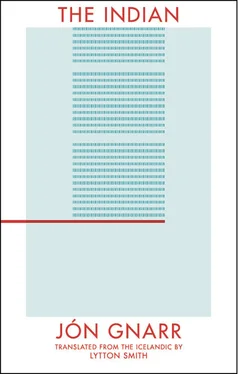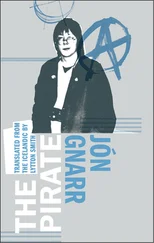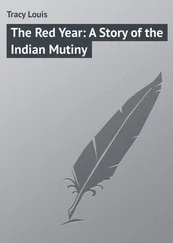Later that summer, Mom and Dad come to visit. They were taking a trip and decided to stop by. It was in the middle of making hay. They camped behind the farm and stayed for two days. Dad helped with the haymaking.
They all liked Dad a lot. So much so, they were amazed such a fun and kind person could end up with such a terrible son.
When they left, they took me with them. Mom found the people odd.
I took my stuff and sat in the car. I didn’t say goodbye to anyone.
When we got home, I looked at pictures Mom and Dad had taken that summer. There were pictures of them camping with other people. There was Kristín and her family and lots more people. There were pictures from fishing trips. Everybody was happy in the pictures. In one picture my dad was standing: in front of him lay so many fish. In one photo, he was smiling with some kids.
I don’t know why I can’t ever be brought anywhere. I don’t know what’s wrong with me. I find it frustrating. I would have preferred to be with them, fishing, than out in the country.
When I started school in the fall, my teacher sent me for a sight test. It turned out that I was near-sighted and had astigmatism and needed glasses.
My dad drove me to get some glasses.
I was taken aback, astonished, when we came out. The whole world had changed, shrinking in countless little details. Where previously there were fog-like blobs, colorful precision appeared. Until now, I’d looked at the world as though through water. My worldview changed in an instant. It was like I’d entered a new world, somewhere I’d never been. Someone had come along and changed everything. The light from the lampposts stopped being blurred and fuzzy. I found I could see forever. Esja was a mountain with slopes and snowdrifts instead of being a vague dark tussock in the distance. A hazy mist gave way to lines and contours on the trees and houses and garages. The light was amazing. I felt like I had been born again.
I recovered, and forgot all about the countryside. It was buried, hidden in the mists of the past, as if it had never existed. Until one day.
They were sitting in the living room and laughing when I entered. Mom was happy and was pouring them coffee.
— Who do you think came to visit?
They were totally different now. Even their faces had changed.
I didn’t greet them. I didn’t want to. I couldn’t fathom why Mom had invited them inside. I went into my room and stayed there until they left. Then I went down and scolded Mom.
— What’s wrong with you? I asked.
— Let it go.
— I hate those cretins!
— Don’t talk that way.
— They’re all total lunatics.
— No, no. They are not lunatics — they’re just different.
I hate them, I said again. Mom shook her head and didn’t answer me.
Had I done something wrong? Are others’ actions always right? How are you meant to behave? What are these invisible rules that I don’t know? What is “normal?” I don’t know what I’m doing wrong. I don’t know. I don’t know how to evaluate things. Am I an attention seeker, a selfish boy, an only child, a mistake? Am I good or evil? Why do I feel so much within my soul? While others’ souls are seated on the very softest of plush couches, existing in a higher plane, it’s like my soul wants to crucify me. While others sleep, I lie awake and chew my nails.
In the country, I was considered lazy because I didn’t want to chase sheep. But I was not actually lazy. I like running. I just didn’t see them. I didn’t know where to run. I didn’t see what everyone else saw. What they thought “normal” was a mystery to me. I don’t see it until someone tells me.

Inside the car, I hide. I don’t want anybody to see me in my nice clothes. They’re silly and brown and made from a material that stings. I’m wearing a shirt and vest. My shoes are ugly, too: brown, creased smart shoes. Everyone will stare at me, like if they saw a monkey wearing nice clothes.
Mom laughs and teases me.
— Who do you think is going to see you?
I don’t care. Preferably no one. I don’t want to be in these stupid clothes. She made me to wear them. I don’t want to go to this boring, silly theater. Plays are boring, except The Pigeon Banquet . And this is not The Pigeon Banquet but some boring adult play.
I lie on the floor in the back seat and stay there the whole way.
When we arrive at the theater, I slip into my seat and look straight ahead. I hope no one I know is here.
The lights go out and the play begins. And so begins the education of my soul: she soars from the muddy floor of the everyday and bathes in the magical light of the spiritual sun, absorbing every word and every gesture. What beauty!
The play is called The Prodigy , based on the book of the same name by Þórbergur Þórðarson. Þórbergur was a bit different. He was like me. He even had red hair. Maybe I’m not an idiot after all, but a prodigy? That would make sense.
I recognize this restless soul and my mind frolics back and forth across manifold existence — the soul’s burning desire to seek things it can’t know and elevate them above all things. I recognize, too, what it is to feel penetrating inadequacy and cultural limitations, to be always at odds with everything that seems natural and normal.
I’m lifted up out of my seat and swept up to the stage and embodied in and assimilated with Þórbergur. He’s me!
I’ve found my soulmate, the lost link of my existence. Finally, after all my searching. Could it be that I’m adopted, after all? Somehow Þórbergur must be my father, if not biologically then at least intellectually. My soul is his soul. Is it possible my mother cheated?
Physically, I’m sitting stiffly in smart brown clothes, a twelve-year-old boy. But no one sees my soul dance up the walls in a crazy joy of newfound liberty. I’m in love. After this, I will never be the same person.
On the way home I forget to lie down on the floor.

Someday, it will be the year 2000. I don’t know when exactly. I don’t know what year it is now. I know I was born in January of the year 1967. That I know, but I don’t know what it means. I’ve no idea how long ago it was.
When I grow up, I’m going to move to Arizona and become a real Indian and live just like real Indians do. I’m going to own a horse and live in a tent. I’m going to change my name. I hate my name. I’m not going to be called Jón Gunnar; instead, I’m going to take some cool Indian name like Big Eagle or Lightfoot.
I won’t use a bow that shoots arrows, but a blowpipe that shoots poison darts. I saw just that on a television program about Indians in South America. After the episode, I went down to the basement. I found plastic pipes and made myself darts by winding paper together and making it narrower at one end. I put nails in that end and fixed them with clay.
My darts went incredibly far. Later, I made more darts and found wider pipes that could shoot bigger darts. I learned to make better-looking darts with sharper points. I stole large needles from Mom’s sewing box and stuck them on the tips with tape and glue.
If I can’t move to Arizona then I’m going to move to Þingvellir and live in a cave in the lava there and be an outlaw. I’m going to catch dinner in the lake and kill birds with my dart gun. I’m going to spy on people and steal what I need without them ever seeing me. I’m not going to let anyone see me or know about my cave. I’m going to make my clothes out of reindeer skin. I’m going to stay awake when I want and sleep when I want and always have a blazing campfire in my cave. And I’ll never go to town except to go to the library so I can borrow and return books that I’ll read in the cave.
Читать дальше




![О Генри - Бабье лето Джонсона Сухого Лога [The Indian Summer of Dry Valley, Johnson]](/books/407344/o-genri-babe-leto-dzhonsona-suhogo-loga-the-india-thumb.webp)









